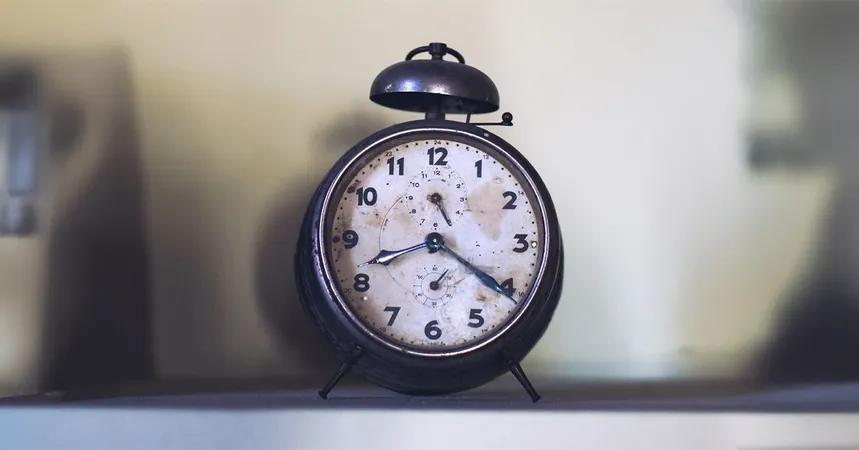
Sleep Less, Think Less: High Blood Pressure and Cognitive Decline Linked!
2024-12-30
Author: Ming
New research is waving a red flag about the alarming relationship between sleep, high blood pressure, and cognitive health. Did you know that snoozing less than six hours a night could not only increase your risk of cognitive impairment, but also exacerbate high blood pressure? A recent study suggests that this dangerous cocktail may speed up brain aging and cognitive decline, especially in those already grappling with hypertension.
The findings, published in the Journal of the American Heart Association, reveal a troubling connection: individuals with hypertension who also enjoy short sleep durations are far more likely to suffer from cognitive impairments and elevated markers of brain aging. Conversely, those who maintain normal blood pressure showed no such deteriorating effects, highlighting the integral role hypertension plays in cognitive health.
This research echoes previous studies that have hinted at an association between insufficient sleep and dementia, but contrasting results have muddied the waters. The new study lays the groundwork for further research, potentially leading to randomized trials that could shed light on how modifying sleep patterns and managing high blood pressure could stave off cognitive decline.
Matthew Pase, the principal researcher and associate professor at Monash University, emphasized the necessity of maintaining healthy blood pressure levels and good sleep hygiene for a healthier brain in old age. He highlighted that regular blood pressure checks and proactive sleep management should become staples of healthcare discussions.
But that’s not all—short sleep durations are also linked to the risk of developing high blood pressure in the first place. Research has established that uncontrolled hypertension in middle age can independently lead to cognitive struggles and dementia later in life. This relationship likely stems from high blood pressure's role in cerebral small vessel disease, which can lead to strokes and significant cognitive decline.
Cerebral small vessel disease causes damage to the small blood vessels in the brain, affecting gray and white matter. Gray matter is crucial for various cognitive functions, while white matter is vital for communication between different parts of the brain. Damage to these areas is often observed in older adults and is tied closely to cognitive decline.
The recent study involved 682 participants over 40, drawn from the Framingham Health Study, who had no history of stroke or dementia. Utilizing sleep questionnaires alongside home-based sleep evaluations, researchers assessed cognitive functions roughly three years after initial evaluations. Remarkably, while self-reported short sleep duration correlated with changes in gray matter volume, linkages to cognitive function appeared only in participants with elevated blood pressure.
Among those suffering from hypertension, shorter sleep duration was connected to deficiencies in executive function—essential skills used in planning, reasoning, and decision-making. Moreover, imaging studies showed increased brain injury markers and white matter lesions in those with both hypertension and reduced sleep.
However, experts urge caution in interpreting these findings. The study is correlational rather than causal, meaning more long-term studies are necessary to fully grasp these relationships. Moreover, some skeptics argue that the evaluated cognitive functions and MRI parameters show only weak correlations with sleep duration.
Christopher Berg, a cardiologist, notes that applying a one-size-fits-all recommendation for sleep duration might not be scientifically sound. However, he supports the idea that prioritizing suitable sleep, particularly for those battling high blood pressure, is essential for mental and physical well-being.
As our understanding of the brain continues to evolve, it is clear: getting the right amount of quality sleep is not just a luxury, but a necessity, especially for those with hypertension. Don’t wait until it’s too late—start prioritizing your sleep health today!

 Brasil (PT)
Brasil (PT)
 Canada (EN)
Canada (EN)
 Chile (ES)
Chile (ES)
 Česko (CS)
Česko (CS)
 대한민국 (KO)
대한민국 (KO)
 España (ES)
España (ES)
 France (FR)
France (FR)
 Hong Kong (EN)
Hong Kong (EN)
 Italia (IT)
Italia (IT)
 日本 (JA)
日本 (JA)
 Magyarország (HU)
Magyarország (HU)
 Norge (NO)
Norge (NO)
 Polska (PL)
Polska (PL)
 Schweiz (DE)
Schweiz (DE)
 Singapore (EN)
Singapore (EN)
 Sverige (SV)
Sverige (SV)
 Suomi (FI)
Suomi (FI)
 Türkiye (TR)
Türkiye (TR)
 الإمارات العربية المتحدة (AR)
الإمارات العربية المتحدة (AR)